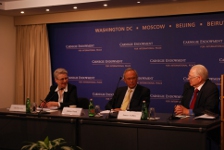Registration
You will receive an email confirming your registration.
The world is still coping with the consequences of the collapse of the Soviet Union. Two decades later, the West has yet to adjust to the post-Soviet reality and Russia has not settled on its relationship with the rest of the world.
At an event hosted by Carnegie, Carnegie Moscow’s Lilia Shevtsova and Sir Andrew Wood of Chatham House, two respected scholars on Russia, discussed their new book, Change or Decay, in which they analyze how relations are shifting between Russia and the world. Carnegie’s Ambassador James F. Collins moderated.
Change or Decay
Written in creative format, Change or Decay presents a series of lively and thought-provoking conversations intended to be thought provoking and to promote discussion. In their dialogue, Shevtsova and Wood offer differing views on how Presidents Putin and Medvedev guided and shaped post-1990s Russia and the trajectory of Russia’s relations with the West.
Putin’s Russia
- Centralization: During the Putin years, Russia witnessed a tightening of central control which limited the political and economic evolution of the country, Shevtsova and Wood stated.
- Failure to Transform: After the collapse of the Soviet Union, Russia experienced a political, civilizational, and intellectual failure to transform, and is currently in the process of “suicidal statecraft,” argued Shevtsova. She cited elections without real democratic options and rising nationalism as evidence of this process. Both Russia and the West failed to foresee the current problems Russia is experiencing, added Shevtsova.
- Opposition: As a result of Western acquiescence in the Russian political system, the Western political model lost its attractiveness to Russians, Shevtsova said. However, she added, it is very unlikely that Russia’s opposition will offer a liberal alternative that is substantively different from the Western model.
- Structural Changes: The introduction of real structural changes, such as creating an independent adjudication and real political accountability, would be riskier for the stability of Putin’s regime than the continuation of the status quo, argued Wood. As a result, it is clear that Putin has no intention of changing course or becoming a real reformer.
- Emergence of a New Mythology: The idea that Putin is doomed to reform is an illusion, argued Shevtsova. The argument that there can be a gradual implementation of the rule of law is a misperception that has been used to justify Putin’s comeback, she said.
Russia’s Foreign Policy
- Russia as a Great Power: Putin envisions Russia as having the right to great power status, where Russia’s proper analog is to be on par with the United States, said Wood. While the central pillar of START renewal may have played to Moscow’s illusions, he said, Russia is not a global great power.
- Russian Nationalism: Whereas Belarusian and Ukrainian nationalism is directed towards the West, Russian nationalism is directed towards the past, said Shevstova. It has been controlled and provoked by Kremlin, although lately this nationalism has been acquiring an increasingly anti-Putin flavor.
Russia’s Future
- Grim Scenarios: Shevtsova sees Russia facing two possible scenarios: the continuation of the current policies and stagnation, or implosion. Both scenarios lead to one outcome – the disintegration of the nuclear-petro-state that modern Russia has become.
- Importance of the Exit Strategy: A lot depends on what exit strategy is developed to escape the current “malaise,” argued Shevtsova. Shevtsova recommended that Moscow has to rethink its strategy towards the West and has to set aside its hopes that nationalism could be constructive.
